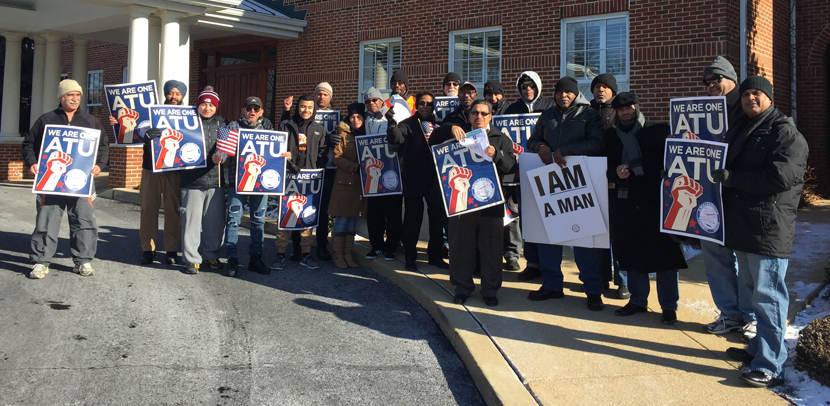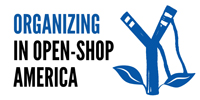Vigorous Campaign Revives Transit Union in Right-to-Work Virginia

After a robust union campaign, the Fairfax Connector went from a unit at risk of decertifying to a strong union shop. Photo: ATU
Going into its latest contract, the transit union in Fairfax County, Virginia, was in tough shape. People weren’t active because they didn’t believe the union could do much—and the union couldn’t do much because people weren’t active.
Management never budged on the issues that stewards brought up. Grievances piled up, unresolved. And since Virginia is a “right-to-work” state, half the workers in the bargaining unit weren’t even members of Transit (ATU) Local 1764.
But after a robust union campaign, in a matter of months the Fairfax Connector went from a unit at risk of decertifying to a strong union shop.

Fairfax County is one of the wealthiest counties in the nation—yet the 600 bus drivers, mechanics, and utilities staff at the Fairfax Connector have no pension, because they work for a private company rather than the county. Many can’t afford to live in the affluent Washington, D.C., suburb where they work.
Workers were seething because they had been cheated out of a retirement plan. In the previous contract, they had given up a 2 percent raise in exchange for a pension. But when a pension plan could not be set up according to the contract’s poorly written terms, the company exploited the loophole and kept the money.
“People saw that the union wasn’t working on their behalf, and they saw that management just did whatever it wanted,” said bus driver Rachid Mhamdi. “There was no trust in the union.”
BACK TO BASICS
How could this situation be turned around? More than a year before the contract was set to expire, the international union embarked on an ambitious campaign to “Fix the (Unfair)fax Connector.” The first step was clear: the union needed a stronger relationship with its members.
ATU staff set out to talk to members and encourage involvement. For starters, to better represent a workforce that includes immigrants from Somalia, Nigeria, Togo, Tanzania, Morocco, Egypt, and India, the local recruited and trained more stewards at each garage, focusing first on re-engaging people who had previously been leaders in the union. A call for volunteers yielded a large contract committee.
For the first time ever, the union began to print newsletters and distribute the contract in Spanish, Amharic, Somali, and Arabic. This was crucial, since the garages are full of “little communities,” says driver John Gillison. “The Middle Easterners hang out and talk to one another, as do the African immigrants and many other groups, but many of them didn’t get involved in the union because of the language barrier.”
Union stewards also created a text-message network where members could get the latest news and shop talk using the mobile phone app WhatsApp. Over half the members joined.
To identify key contract issues, the local surveyed members—something it had never done at this workplace. Stewards distributed surveys to all members in various languages, and received an encouraging response rate of 25 percent after two weeks.
The results showed that a top priority for most members was to achieve parity in wages and benefits among the three Fairfax Connector garages. The two newer garages, which had more recently joined the union, didn’t make as much as the original garage. Other key issues were boosting wages generally, shortening the time it took to reach the top rate of pay, and improving the retirement plan.
There were other problems too. Mechanics reported that maintenance staff would often find water bottles full of urine on buses, as drivers had no other option during uninterrupted shifts of up to 10 hours behind the wheel. Fully half of all the survey respondents said they often went without bathroom breaks. A whopping 74 percent said that fumes on the buses were a big issue.
Before this campaign, “sometimes you’d go to a union meeting and there’d only be seven or eight people there,” shop steward Luis Santiago said. But the activists’ outreach and the new app generated a buzz that began to attract more and more people to membership meetings—until the union struggled to find a room big enough to fit everybody.
OPENING VOLLEY
Local 1764 activists began to pursue the ultimate cause of their misery—not their direct employer, a giant multinational corporation called MV Transportation, but the Fairfax County Board of Supervisors.
This legislative body, made up of eight Democrats and two Republicans, had contracted out the work since the service began in 1985. Nevertheless, the county still owns the buses, sets the routes, establishes work rules, handles customer complaints, and even reserves the right to make the company fire someone.

SUPPORT LABOR NOTES
BECOME A MONTHLY DONOR
Give $10 a month or more and get our "Fight the Boss, Build the Union" T-shirt.
To explain the issues that workers were facing, the contract committee attempted to meet with every supervisor on the board. Stunningly, some of the supervisors had never even heard of MV Transportation, despite its $70 million contract with the county. The supervisors sounded sympathetic at first, but they were reluctant to get involved, hiding behind the excuse that they couldn’t take sides in a private matter.
Next the contract committee organized a phone blitz. Members distributed flyers urging their co-workers to call the Fairfax Connector’s complaint hotline—usually used by customers to track down a lost bag or to complain about a late bus. After dozens of workers called to air their grievances about the absent pension, the county stopped taking hotline calls.
Members began to call the supervisors directly. The committee mobilized 30 members to pack a county board meeting, where senior bus driver Robert Snyder testified about the injustice of public servants in one of the richest counties in the nation not being able to retire with a pension or any dignity whatsoever.
RAMPING IT UP
With the company holding out and the county supervisors hiding out, next Local 1764 Trustee Sesil Rubain led a press conference outside the Fairfax County Government Center. Dozens of members marched up to the county executive’s office to deliver a petition with hundreds of signatures.
We flyered at transit stations during rush hour and at public events. Twenty members braved frigid temperatures to educate Virginia Democratic Party bigwigs outside their brunch fundraiser at a posh country club.
To kick off the first day of bargaining, workers held their first informational picket in years—right in front of management’s office. And after a few unproductive bargaining sessions, 100 members rallied in the Fairfax town square, took over Main Street, and marched through the heart of town.
But when the company still refused to address the major issues in the next sessions of bargaining—and went on the offensive by unilaterally implementing background and credit checks on our members—union leaders asked outraged members to take a strike authorization vote.
Around 150 people turned out for the most-attended meeting in the union’s history. When the strike motion came up, the room exploded in cheers. By secret ballot, members voted unanimously to authorize a strike if MV didn’t settle a fair contract.
Gillison called the experience life-changing. “In my 68 years,” he said, “I have never seen a brotherhood and a sisterhood come together at the workplace like that.”
VICTORY AND BEYOND
Setting a strike deadline did the trick. The company finally gave way on many issues, and settled a contract.
The wage progression was shortened from 15 years to five. Top pay for bus operators rose to $32.25 per hour, and the union bridged much of the gap in compensation between garages.
On retirement, while workers didn’t get a pension, the company agreed to increase its 401(k) match by 250 percent. Workers also won back the wages they had given up in the previous contract for the failed pension proposal.
The union won much better language on bathroom breaks, beat back the credit and background checks, and got the company to adopt a number of the union's recommendations to address the fumes. MV replaced the faulty hoses that used to leak coolant that would burn up and cause strong odors in buses. The company retrofitted older buses with longer exhaust tips to prevent exhaust from coming into the air intake vents, and sealed the engine compartments and other vehicle openings to help prevent fumes from seeping into the cabin.
Another upshot of the campaign was the ousting of the much-hated vice president of operations, who had been chiefly responsible for management’s uncooperative attitude. In the wake of his departure, Santiago said, “management started showing us respect that we’d never seen before. They started to talk to us, respond to meetings, and work out issues with the shop stewards.”
Over the course of this campaign, the union signed up nearly 200 new members, bringing its membership rate above 85 percent of the bargaining unit. “Once people started to get educated about the union and began to see all the activity going on,” said Santiago, “they got excited about the union and they wanted to sign up and join.”
John Ertl is a field mobilization specialist for the Amalgamated Transit Union.
